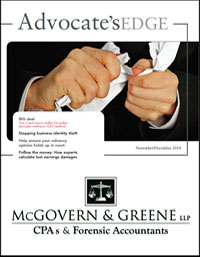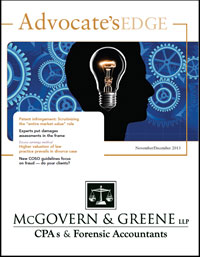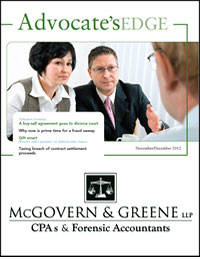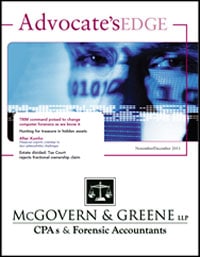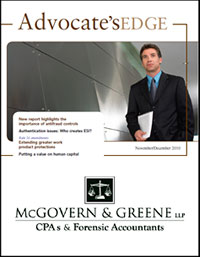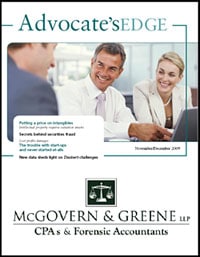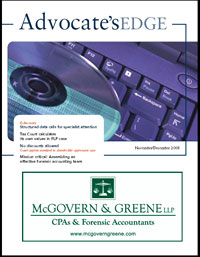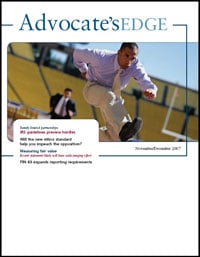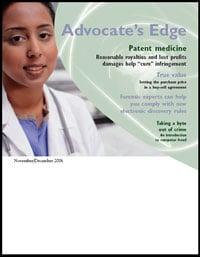Advocate’s Edge
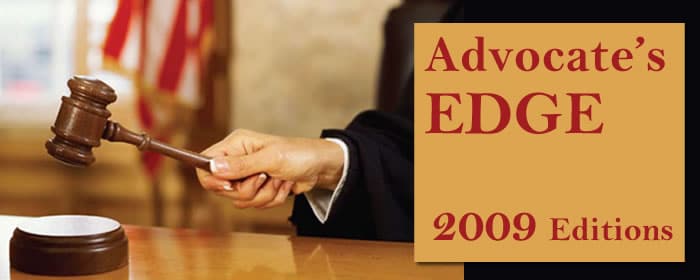
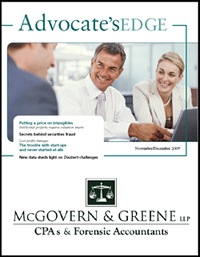 NOV/DEC 2009 Issue of Advocate’s Edge
NOV/DEC 2009 Issue of Advocate’s Edge
Putting a price on intangibles
Intellectual property requires valuation smarts
Intellectual property such as patents, copy-rights and trademarks can present some of the most difficult business valuation challenges. The American Society of Appraisers has recognized this by issuing a standard for valuing such intangible assets. The standard, known as BVS-IX, Intangible Asset Valuation, gives attorneys an idea of what to expect from their valuation experts and provides a baseline for evaluating the work of opposing experts. This article takes a look at factors appraisers consider when valuing intangible, while a sidebar lists some specific valuation factors addressed by the standard.
Secrets behind securities fraud
Growing numbers of individuals, entities and institutions have poured into the securities and commodities markets in recent years. Increased participation has, in turn, led to increased opportunities for — and incidents of — fraud. Particular schemes to look out for are Ponzi and pyramid schemes, along with “pump and dump” scams that fraudulently inflate stock prices.
Lost profits damages
The trouble with start-ups and never-started-at-alls
When calculating lost profits damages for businesses involved in litigation, damages experts can use the company’s historic financial statements to make their projections —if the business has a history. However, calculating damages for early-stage and never-launched businesses requires a different set of analytical tools if experts are to prove to a court’s satisfaction that their damages estimates are reasonably certain. This includes eco¬nomic and financial data for the subject company, but also market data.
New data sheds light on Daubert challenges
Recent PricewaterhouseCoopers data shows an increase in the number of Daubert challenges and reveals some of the factors critical to the out¬comes in financial expert testimony challenges. Research found that lack of reliability was the leading cause of a financial expert opinion being excluded, but jurisdiction can also play a role.
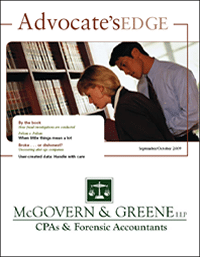 SEP/OCT 2009 Issue of Advocate’s Edge
SEP/OCT 2009 Issue of Advocate’s Edge
By the book
How fraud investigations are conducted
When a company suffers fraud, it needs the assistance of a fraud expert to find the perpetrator and collect evidence. A recent guide, published jointly by several industry associations, outlines the approach a qualified expert will take to execute a fraud investigation. After determining the appropriate process for the matter at hand, the expert will move the investigation through three stages: interviews, evidence collection, and evidence analysis. This article also describes corrective steps that can be taken before or after an investigation is complete, while a sidebar discusses factors that may influence a specific investigation’s plan.
Pellom v. Pellom
When little things mean a lot
When one couple decided to divorce, the husband wasn’t happy when the court accepted his wife’s expert’s valuation of his share in an anesthesiology practice at $1.2 million. His own expert had arrived at a figure of $183,000. On appeal, the husband raised several technical objections, which were ultimately rejected. It appears the primary reason for the discrepancy between the two experts’ valuations was the husband’s expert’s failure to account for the practice’s goodwill.
Broke … or dishonest?
Uncovering alter ego companies
Most companies filing for bankruptcy accurately represent their assets. But a small percentage of filers that claim to have little or nothing to offer creditors aren’t being honest. Instead, they’ve diverted resources to an alter ego company or are hiding their connection to a much healthier corporate parent. Uncovering and proving this type of fraud can be difficult, but there are a variety of red flags that enable forensic accounting experts to expose such schemes. Conversely, forensic experts can help defendants prove that any alter ego accusations are unfounded.
User-created data: Handle with care
Production of electronically stored information (ESI) has become a routine part of discovery. But the primary target of an ESI request often is user-created data — a type of information that’s constantly evolving and can prove elusive. A qualified expert can help extract all the user-created data needed.
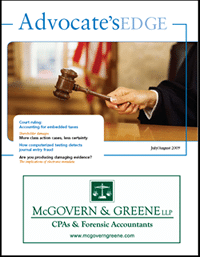 JUL/AUG 2009 Issue of Advocate’s Edge
JUL/AUG 2009 Issue of Advocate’s Edge
Court ruling: Accounting for embedded taxes
A hotly disputed business valuation issue recently was addressed in a seven-years-plus divorce case, one of first impression in New York. The appellate level court considered the extent to which the value of a holding company owned by the husband should be reduced to reflect the federal and state taxes embedded in the securities owned by the company due to unrealized appreciation. The case involved choosing between an “historical tax rate” approach to valuation vs. one in which an actual sale of the company’s assets is assumed to occur on the valuation date. A sidebar addresses the argument of the husband’s expert that the company’s value should be reduced by the nontax costs of liquidation.
Shareholder damages
More class action cases, less certainty
The number of securities class action suits has escalated in recent years. And because greater market volatility historically correlates with an increased level of securities litigation, the numbers can be expected to rise. Market instability can also complicate the already tricky process of calculating shareholder damages. This article discusses some of the steps involved in attributing price, along with the trading models that might be used in aggregating damages.
How computerized testing detects journal entry fraud
Fraudulent journal entries are extremely susceptible to management override of internal controls. And manual testing may miss evidence of fraud, since it can only examine a portion of general ledger entries. Computerized testing, however, considers the entire dataset, reducing the risk of overlooking critical evidence. Such testing also allows fraud experts to devote more time to other aspects of the investigation, such as gathering information about the business and interviewing employees.
Are you producing damaging evidence?
The implications of electronic metadata
Electronically stored information (ESI) has become one of the most prominent types of litigation evidence. Such records contain critical bits of forensic evidence — or, metadata — that aren’t found in their hard copy counterparts. When parties produce electronic documents, therefore, they also may be producing revealing, even damaging, metadata. Before it begins to gather and review potentially responsive files, the producing party must preserve requested ESI with its metadata. Forensic experts can help by imaging a company’s servers and hard drives before the files are searched and reviewed.
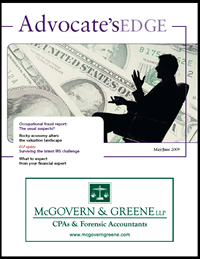 MAY/JUN 2009 Issue of Advocate’s Edge
MAY/JUN 2009 Issue of Advocate’s Edge
Occupational fraud report: The usual suspects?
The Association of Certified Fraud Examiners’ latest Report to the Nation on Occupational Fraud and Abuse collected and summarized information on almost 1,000 cases of employee fraud. The report’s results can help businesses and their legal counsel understand how demographics, job responsibilities and level of authority are connected to certain types of fraud and, thus, limit losses. This article outlines the demographic characteristics, job responsibilities and income levels of people who are more likely to commit fraud. It also provides tips on spotting red flags of an active fraud scheme.
Rocky economy alters the valuation landscape
The ripple effect of the global economic downturn has reached the realm of business valuation. As the value of real estate and businesses in many industries has dropped dramatically, valuators have been forced to change some of their methods. This article explains how declining values are affecting how appraisers approach estate, divorce and merger and acquisition valuations. These experts, for example, may advise delaying the estate valuation date as late as the law allows or move up divorce court dates.
FLP update
Surviving the latest IRS challenge
For years, the IRS has used a variety of tactics to challenge family limited partnerships (FLPs). In 2008, it took a relatively new approach — arguing that transfers of partnership interests in an FLP were actually taxable indirect gifts of the assets held by the FLP. But the U.S. Tax Court rejected the IRS’s argument, as well as its claim that the “step transaction” doctrine applied, in the latest case to consider this argument, Gross v. Commissioner. This article summarizes the facts and findings of Gross and suggests ways practitioners can help an FLP survive IRS challenge.
What to expect from your financial expert
While working in the areas of dispute resolution, litigation and potential litigation, financial experts wear many hats. To ensure the quality of these experts’ litigation support services, the American Society of Appraisers has issued nonbinding guidelines on the proper role of the independent financial expert. This article discusses the guidelines, including the reasons financial experts are engaged and the procedures they should follow when conducting an assignment.
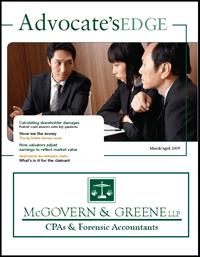 MAR/APR 2009 Issue of Advocate’s Edge
MAR/APR 2009 Issue of Advocate’s Edge
Calculating shareholder damages
Federal court answers some key questions
A recent Eleventh Circuit court decision, Cox Enterprises, Inc. v. News-Journal Corp., demonstrates the role fair market value can play in shareholder litigation — even when a statute calls for fair value. This article summarizes the facts of the case and explains why the court’s ruling suggests that experts should account for the realities of a company’s circumstances when valuing its shares.
Show me the money
Tracing hidden business assets
To secure a fair and equitable resolution, attorneys in divorce cases may need to trace assets and income that a business owner spouse has hidden to reduce child support, alimony liability or the final settlement amount. This article discusses how forensic accountants trace hidden assets by looking for suspicious payments, on-book fraud schemes and the artificial reduction of a company’s earnings.
How valuators adjust earnings to reflect market value
When appraising a company, valuators scrutinize their subjects’ balance sheets, but they also recognize that those numbers only reflect a business’s “book value” at a point in time. To arrive at the most accurate market value, experts must adjust or “normalize” a company’s earnings. As this article explains, this process may involve adjusting such items as accounts receivable, inventory, taxes, prepaid expenses and contingent liabilities.
Employment discrimination claims
What’s in it for the claimant
With the economy in a recession and unemployment on the rise, the number of employment discrimination claims is likely to continue to increase. This article discusses the general remedies available to successful claimants regardless of whether the discrimination was caused by intentional acts. It also talks about the variables involved in determining compensatory and punitive damages, including evidence of actual harm to the claimant and malice on the part of the employer.
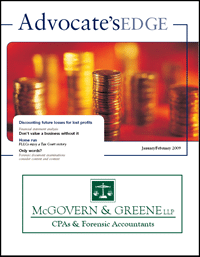 JAN/FEB 2009 Issue of Advocate’s Edge
JAN/FEB 2009 Issue of Advocate’s Edge
Discounting future losses for lost profits
In many business litigation cases, financial experts must project damages for losses that the plaintiff will incur in the future because of the injury involved. Discounted future losses represent the amount of compensation needed now to replace that future lost income. But, as this article discusses, losses in a litigation context are different from the lost income that comes up in business valuation situations, requiring an expert to calculate a discount rate based on relevant risks.
Financial statement analysis
Don’t value a business without it
Merely accepting a company’s financial statements at face value can lead to seriously undervaluing or, more likely, overvaluing a business. Often, closely held companies fail to comply with GAAP, and financial data may be shaped to favor the owner’s interests. This article explains how experts review several years of financial statements and make normalizing adjustments such as removing nonrecurring items and adjusting expenses that a potential buyer wouldn’t likely incur. They also look for suspicious trends and relationships.
Home run
FLLCs enjoy a Tax Court victory
In recent years, taxpayers have found themselves on the losing end in cases questioning the legitimacy of FLPs and FLLCs. But, in a 2008 case, Estate of Mirowski v. Commissioner, the U.S. Tax Court threw a curve ball, allowing family FLLC assets to be excluded from the decedent’s gross estate. This article summarizes the case and suggests that taxpayers can use the court’s findings to form and operate these vehicles.
Only words?
Forensic document examinations consider content and context
Fraud investigations almost inevitably require documentary evidence to be examined — and it’s not a job for amateurs. Professional forensic document examiners review not only the content of documents. They also consider physical and latent evidence, such as handwriting, alterations and faded or decomposed material. To ensure accuracy and opinions that will stand up in court, experts follow scientific procedures and use technologies such as electrostatic detection apparatus.
This publication is distributed with the understanding that the author, publisher and distributor are not rendering legal, accounting or other professional advice or opinions on specific facts or matters, and, accordingly, assume no liability whatsoever in connection with its use.
GFAS Advocate's Edge Archives
Expert Forensic Accounting Services
Chicago | Las Vegas
FORENSIC ACCOUNTING
SERVICES
Insurance Claims
Accounting Investigations
Mergers & Acquisitions
Due Diligence Reviews
Dispute Advisory Services
Special Examinations
Contract Audits and Recoveries
LITIGATION SERVICES
Expert Witness Testimony
Commercial Damages
Shareholder/Partner Disputes
Bankruptcy and Insolvency
CPA Malpractice Claims
Contract Disputes
Estate and Trust Disputes
Data Mining & Electronic Discovery
FRAUD EXAMINATIONS

